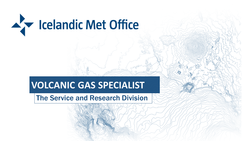Volcanic gas specialist
Volcanic gas monitoring
The Icelandic Meteorological Office (IMO) is seeking a specialist within the field of volcanic gas emissions and atmospheric monitoring of volcanoes to join the Department of Volcanoes, Earthquakes and Deformation within the Section of Services and Research. The successful candidate will be involved in the volcano monitoring team and will respond to volcanic crises in addition to strengthening efforts for long-term monitoring of volcanoes in Iceland.
Icelandic Met Office
IMO is a governmental agency responsible for monitoring natural hazards nationally and to provide information and warnings of impending hazardous natural events. It was officially designated as a State Volcano Observatory in 2011 by the Icelandic Transport Authority (ITA) and it was given the responsibility of reporting on volcanic unrest and volcanic eruptions in Iceland to the London VAAC, and other aviation stakeholders. This appointment was done in the aftermath of the volcanic eruption in Eyjafjallajökull in 2010 and as soon as the Grímsvötn eruption started in 2011. IMO has responsibility for monitoring, forecasting and warning of almost all natural hazards in Iceland, including volcanic unrest and eruptions at any of the 33 volcanoes and volcanic systems in the country. In the monitoring room there are four experts on duty during the day (two natural hazard specialists and two meteorologists), which will be reduced to two during the night-time. The work in the monitoring room is supported by a group of scientists (seismologists, geophysicists, geochemists, volcanologists, hydrologists) who help with evaluating ongoing events, by processing monitoring data and interpreting them considering background knowledge and long-term trends.
The tasks for the post include
Participating in remote-sensing and direct in-situ gas measurements in various volcanic settings in Iceland; designing, developing and implementing data processing and early warning to be used by the 24/7 natural hazard monitoring; collaborating in volcano monitoring in Iceland; communicating with a wide range of stakeholders, including but not limited to: the public, civil protection, aviation, energy sector, media; participation in projects including hazard assessment work and research.
Requirements:
At least an MS degree in geochemistry, geophysics or a related field
Expert knowledge of volcanic gases
Experience with gas data processing, visualization and interpretation
Experience with programming and data visualization
Experience with gas measurements
Knowledge of atmospheric processes including gas dispersal dynamics
Ability to work effectively within a multidisciplinary research team
Fluency in English
Competency in Icelandic is a benefit
Experience with numerical modelling is a benefit
Knowledge of hazard assessments is a benefit
Experience writing scientific papers and reports is a benefit
We seek a candidate who is knowledgeable, reliable, cooperative and who demonstrates initiative. Our hiring process will take these IMO values into account.
Additional information about the position:
The salary for the position is consistent with the pay agreement between the Minister of Finance and the Economy and the trade union that the candidate is eligible to join.
This is a full-time, 100% position.
The application deadline is 22. April 2024.
People of all genders and places of origin are encouraged to apply for the job. The job requires the ability to perform fieldwork in challenging conditions.
Applicants should apply for the position through the government portal for job applications found here or send an email to Borgar Ævar Axelsson at borgar@vedur.is
The application must be accompanied by a CV and a letter of motivation that explains the interest of the applicant in the position and their relevant qualifications and experiences and highlights why the candidate would be suitable. Copies of degree certificates and a list of published works must be included with the application.
For further information:
Kristín Jónsdóttir, Head of the Department of Volcanoes, Earthquakes & Deformation, kristinj@vedur.is
Borgar Ævar Axelsson, Human Resources, borgar@vedur.is




